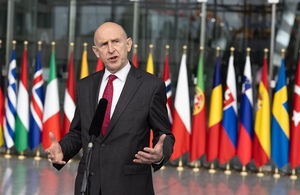Britain bolsters NATO’s eastern flank with new pact with Estonia and new cooperation on missile defence
The Defence Secretary will sign new defence roadmap with Estonia, underlining key NATO commitment and will begin cooperation with Allies on missile defence.

Defence Secretary John Healey at NATO HQ, Brussels (17-10-24). MOD Crown Copyright.
Britain will strengthen NATO’s eastern flank with a new defence roadmap signed with Estonia today and cooperation on missile defence.
The joint declaration, signed at a meeting of NATO Defence Ministers today will see thousands of troops from the Army’s 4th Brigade held at high readiness, ready to defend NATO’s eastern flank, in addition to those deployed in Estonia.
At today’s (Thursday 17 October) meeting in Brussels, Defence Secretary John Healey will also agree to step up cooperation on missile defence and developing long range missiles with NATO Allies. The UK will lead the new ‘DIAMOND’ initiative, to integrate NATO’s missile defences, while also pledging to develop new long-range, cutting-edge missiles, improving the Alliance’s collective air defence and offering opportunities to the UK defence industry.
The 4th Brigade is an agile force, specialising in operating in terrain found in Estonia. In future years the Army will deploy its most advanced tanks, Challenger 3 to NATO’s eastern border for the first time, along with armoured vehicles such as Boxer.
These announcements underline the UK’s ‘NATO-first’ policy and the Government’s unshakeable commitment to the alliance.
The 4th Brigade will also be bolstered with key equipment in times of crisis, including helicopters, short range-air defence and guided multiple rocket launchers. The announcement follows a visit by the Defence Secretary to Estonia in July to meet British troops stationed along the NATO eastern flank.
Defence Secretary John Healey MP said:
As global threats increase, the UK’s unshakeable commitment to NATO has never been more important. We are boosting our support for Estonia, with thousands of troops ready to deploy rapidly to the Russian border.
I recently visited our dedicated troops posted at the NATO front line in Estonia to thank them for their service in safeguarding Europe in the face of growing Russian aggression.
These announcements reinforce our contribution to the NATO alliance for decades to come. We are working closely with partners to develop advanced defensive and offensive capabilities to protect our citizens whilst boosting industry, jobs and growth in the UK.
While at NATO, the Defence Secretary will meet his Estonian counterpart to sign the new roadmap, reaffirm NATO’s commitment to supporting Ukraine at a meeting of the NATO-Ukraine Council, and conduct bilateral talks with several Allies, including Norway and Turkey and will hold an E3 Ministers’ meeting with France and Germany.
Estonia joint declaration
The UK and Estonia will deepen their already close defence partnership, standing united against Russian aggression. This joint declaration will see the UK’s 4th Brigade Combat Team held at high readiness from July 2025. This means that thousands of troops will be on standby to deploy to Estonia at short notice, reaffirming the UK’s ironclad commitment to protecting and defending our allies.
The UK will maintain its permanently stationed battlegroup in-country, with Estonia being the first deployment of the UK’s cutting-edge Challenger 3 tanks – as well as armoured vehicles including Boxer infantry vehicles.
Missile defence
The UK-led DIAMOND initiative will improve NATO’s integrated air and missile defence by ensuring that the different air defence systems across the Alliance operate better and more jointly across Europe. In Ukraine, air defences have played a vital role in protecting towns, cities and strategic positions. DIAMOND will strengthen the way European NATO allies coordinate their air defence against missile attacks.
Long range missiles
The UK will also take part in the European Long-range Strike Approach programme. Working alongside international allies, France, Germany, Italy, and Poland, the UK will develop new cutting-edge long range missile capabilities, with the project expected to play a key role in Europe’s defence by the 2030s. The move underlines the Government’s desire to work closer with European allies on key areas of security.
Today’s meeting of NATO Defence Ministers is the first chaired by the new NATO Secretary General Mark Rutte and is the first that the Defence Secretary has attended since taking up his post.